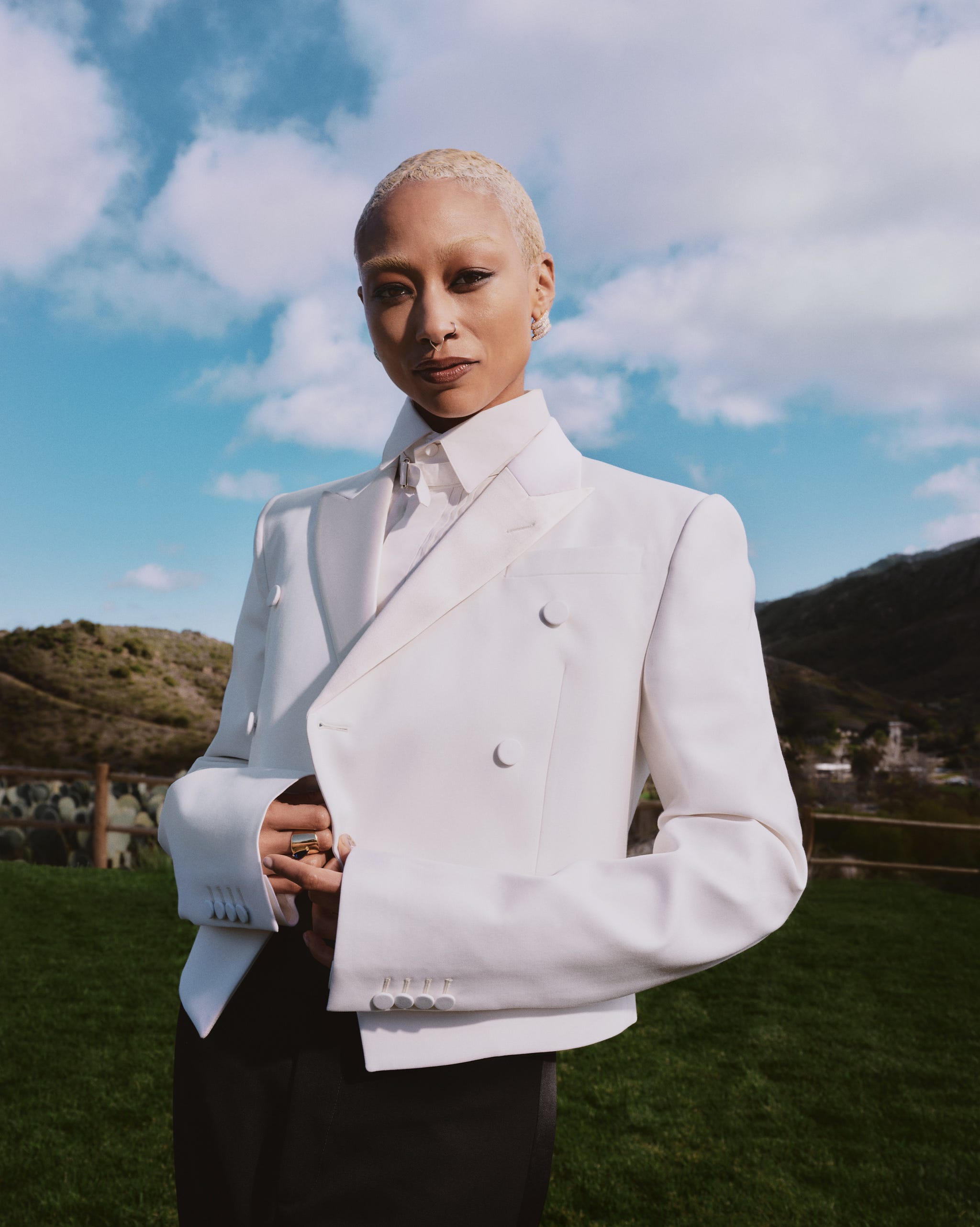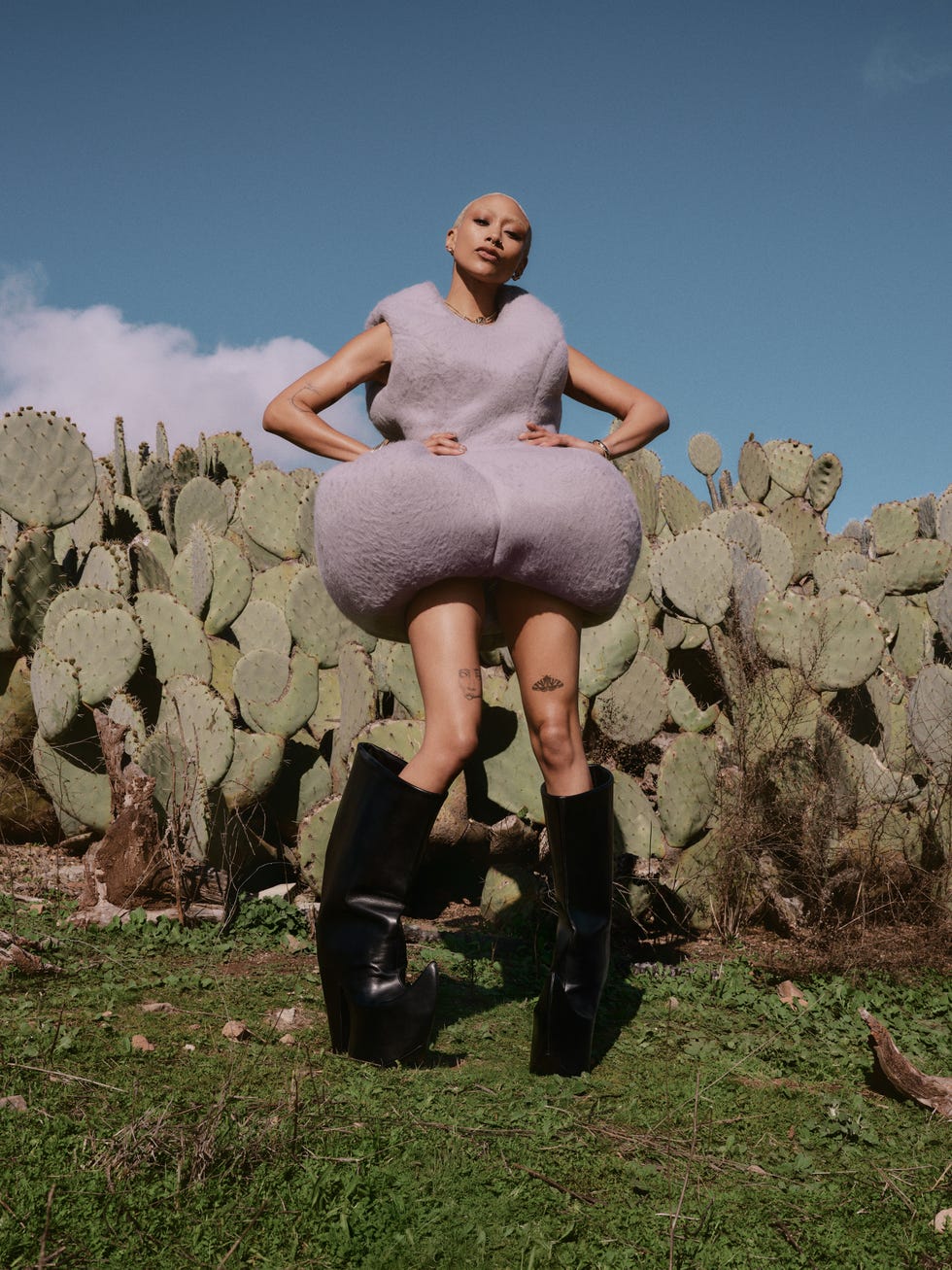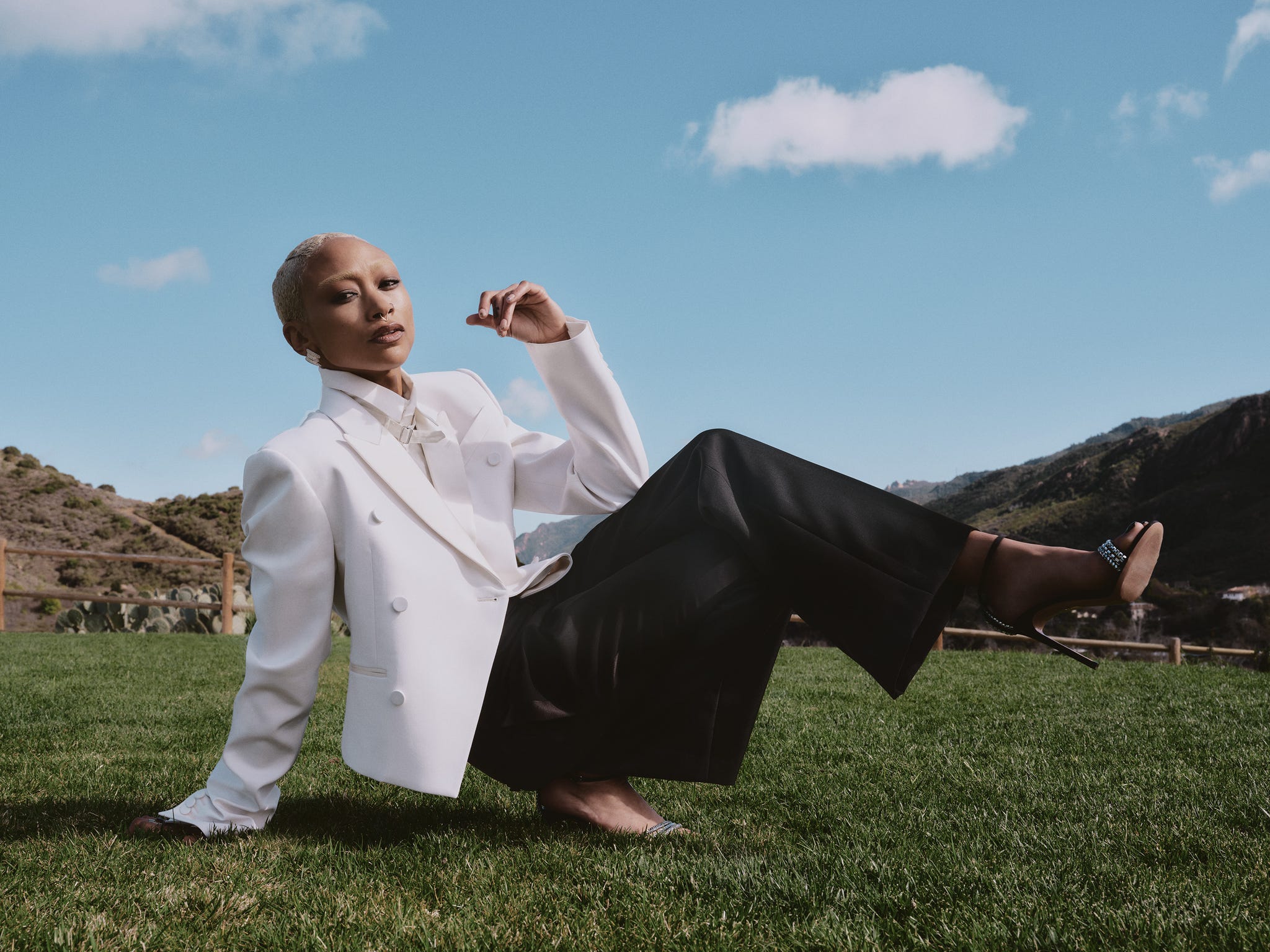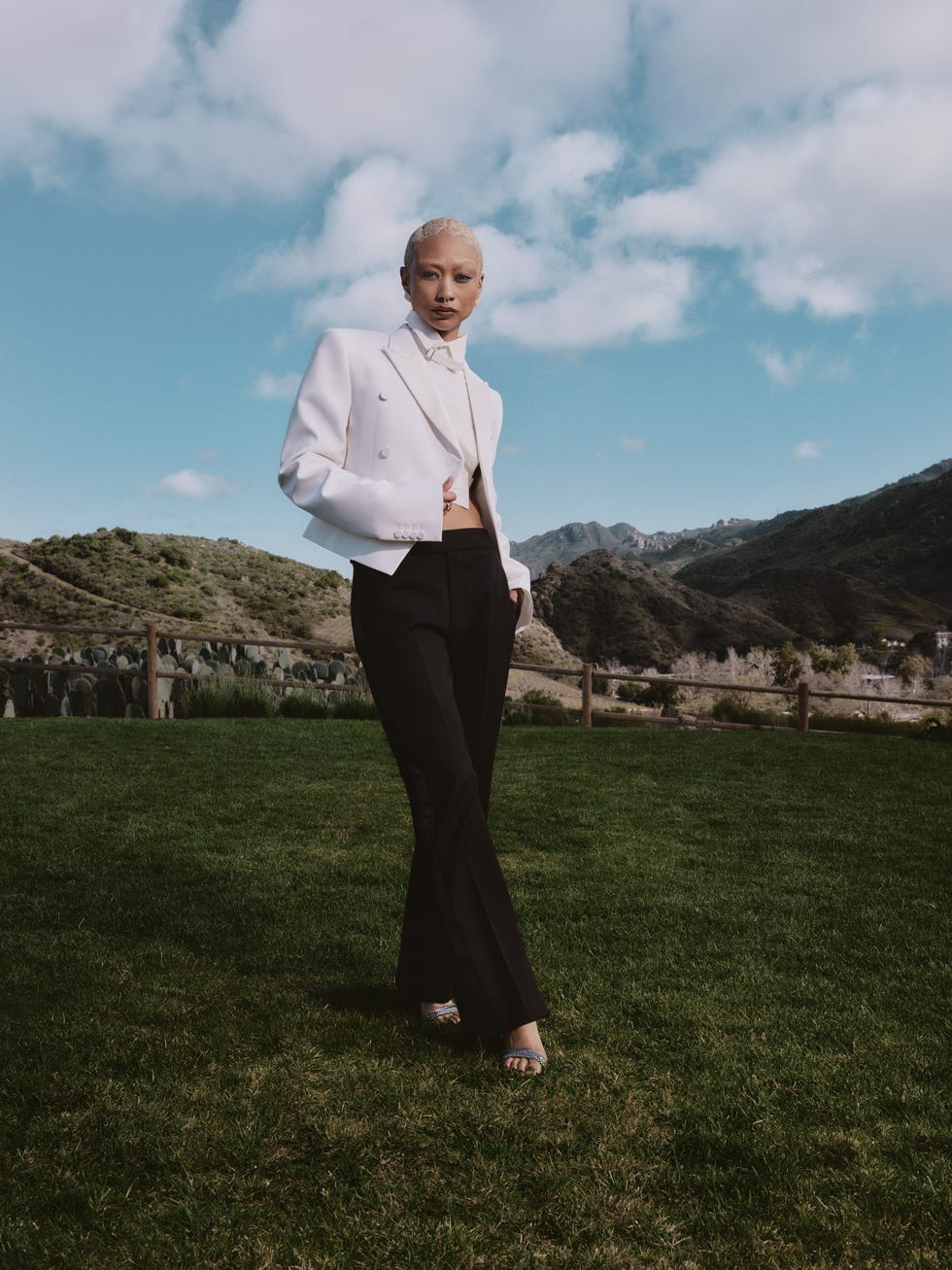How Tati Gabrielle Turned Quiet Strength Into Unshakable Power


Tuxedo jacket, bib, trousers, McQueen. Earrings, ring, Anita Ko.
We meet Tati Gabrielle’s characters before a word is ever spoken. In The 100, her wide, doe-like eyes burn with a cold, unyielding glare. As Nora in The Last of Us season 2, she’s introduced amid civil unrest, her eyes lidded with impending dread. And as Marienne in You, they soften with intrigue—we (and Joe) meet her in a library, after all. It’s almost impossible to believe there was ever a time she didn’t recognize her power.
“I was a very socially awkward kid and slow to speak,” she says, “but I loved to present my emotions and thoughts visually.” She credits her upbringing in the San Francisco Bay Area for instilling her with a “sense of strong individuality, loyalty, and justice.” Gabrielle eventually cut her teeth in a third grade play, prompting her teacher to tell her mom, “She’s got something—you’ve got to [nurture] that.” When her mother urged her to continue to pursue theater, she resisted and auditioned for the Oakland School for the Arts as a visual arts student instead. Ironically, she forgot her sketchbook that day, and fate intervened: Theater it was.
Her calling was anchored in 10th grade during a school trip to Edinburgh, Scotland, where her theater class performed a play. On the streets of the Festival Fringe, she witnessed how this form of storytelling could captivate an audience. “Seeing the way that somebody can watch something and it speaks to them in such a way that will make them go about life differently from that moment on,” she says, “I realized how much that had happened to me growing up, like watching Spy Kids and coming out of the movie saying, ‘I can do this.’”

Bubble dress, boots, Marc Jacobs. Earrings, necklace, bracelets, Cartier.
The thing about fate is, no matter how hard you try to escape it, a voice will always lead you back to your rightful path. Gabrielle considered a career in criminal profiling, and majored in French at Spelman College, with dreams of becoming a diplomat. It wasn’t until she overheard her mother telling people she wanted to pursue criminal justice that something inside her snapped. “No, I want to be an actor,” she instantly thought.
“[Black women] have been forced to grow up in a world where we have to be aware at all times.”
Battling depression, she left college on medical leave and returned to the Bay Area feeling lost and uncertain. But her inner voice knew what she needed to hear. Or at least her high school best friend did, when she called her out of the blue and suggested they move to Los Angeles together. “To me, it was the universe’s call,” she says.
She dipped her toes into acting with an appearance on a Nickelodeon show, but felt like kid shows didn’t reflect her potential. “It was a good introduction to what a film set is like, but I wanted to challenge myself to tell stories that were impactful on all levels,” Gabrielle says. That meant finding roles that acknowledged her identity as a Black and Korean-American woman. “In the first couple of years [of acting], nobody knew where to place me. I wasn’t Black enough to be Black. I wasn’t Asian enough to be Asian,” she remembers.

Tuxedo jacket, bib, trousers, McQueen. Earrings, ring, Anita Ko.
Growing up in the diverse Bay Area presented a stark contrast to Hollywood’s narrow perspectives. When she was appearing in Chilling Adventures of Sabrina, a scene depicting her character, Prudence, being lynched sparked backlash. “Black Twitter went off,” she says. Showrunner Roberto Aguirre-Sacasa envisioned an innocently color-blind world, but audiences didn’t perceive a witch existing in a fictional, supernatural realm—they saw a white woman hanging a Black woman.
“I can never let something like that happen again. I can’t let my people down,” she says. From then on, she made it her mission to ensure her roles reflected the realities of women of color. Before accepting her role in You, she met with showrunner Sera Gamble. “I told Sera that since I’m going to be Joe’s new obsession, and all of the women before me have been white, there are certain things that, as a woman of color, are not going to go the same way,” she says. “[Black women] have been forced to grow up in a world where we have to be aware at all times. We think differently. We have to protect ourselves differently. So Marienne cannot be oblivious.”

Tuxedo jacket, bib, trousers, McQueen. Earrings, ring, Anita Ko.
When we last saw Marienne, she had outsmarted Joe and left him believing she was dead after an apparent overdose. But by the end of season 5, she returns with a chilling one-liner: “You should’ve killed me better, Joe.” The moment was bittersweet for Gabrielle, who was grieving the death of her friend and Sabrina co-star, Chance Perdomo. Still, she found solace in Marienne’s resilience. “Women, we love hard and love really big, and we will falter, but don’t let that falter be your end,” she says.
For the girl who once spoke so little, finding her voice—one that carries weight, power, and purpose—hasn’t come easily. “Prudence taught me how to be unapologetic, and Marienne taught me grace—that there’s always room to find joy, no matter what happens,” she reflects. As for Nora in The Last of Us, she’s learning the weight of her choices. “All of these characters are so blatantly flawed, and [The Last of Us] doesn’t necessarily try to redeem them. Nora started teaching me that you are your choices. You can have as much intention and heart as you want, but what the world sees are your actions. Your choices define you,” she says. “And you can’t run from the things you’ve decided on.”
Hair by Sami Knight for Rehab; makeup by Alexandra French at Forward Artists; manicure by Johanna Castillo; produced by Anthony Federici at Petty Cash Production; photographed at Malibu Creek Ranch.A version of this article appears in the Summer 2025 issue of ELLE.
elle




